- Home
- Compare Systems
- Cheap Systems
- Free Quotes
- DIY Systems
- Hardwired Systems
- Wireless Systems
- Smoke Detectors
- Medical Alarms
- Alarm Monitoring
- Cameras & Video
- Ademco
- ADT Security
- Brinks Security
- Broadview
- DSC Security
- FBI Alarms
- GE Security
- Honeywell
- Link Interactive
- Monitronics
- Moose
- Napco
- Protection 1
- Radionics
- Simplisafe
- Alarm Manuals
- Alarm System Parts
- Alarm Tools
- Troubleshooting
- FAQ
- Glossary
- Sitemap
- About Me
- Contact Me
The Digital Multimeter
as an Alarm Installation Tool
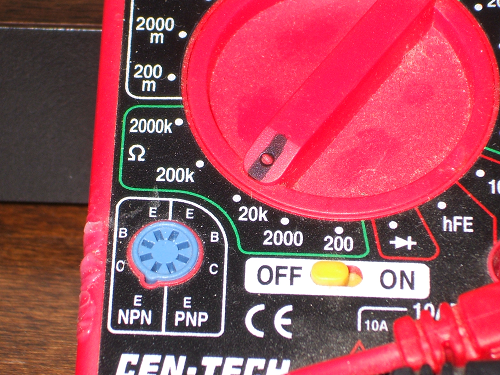
A digital multimeter (Also known as a DMM, handheld multimeter, or mini-multimeter) is vital if you do any kind of alarm service or installation. Like its predecessor, the analog multimeter, these meters combine several measuring tools in one.
The typical types of measurements they are capable of making include:
- AC Voltage and Current
- DC Voltage and Current
- Resistance, measured in Ohms
- Continuity
While an analog multimeter uses a swinging needle to point to readings on a scale, the digital version shows the measured values with an easy-to-read 7-segment LCD numerical display.
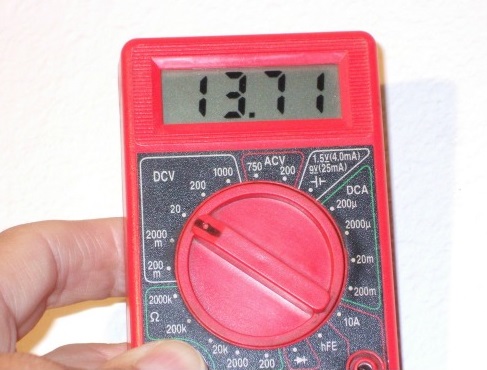
Digital Multimeters for Alarm Work
When dealing with home security systems, multimeters are most often used for:
- Testing backup batteries in alarm panels
- Checking wireless transmitter batteries
- Checking transformer, power supply and loop voltages
- Measuring resistance of magnetic contacts and alarm loops
- Checking for foreign grounds on any wiring
DMM’s come in a wide variety of price points and quality levels. Very cheap, lightly constructed units with basic measurement features are good enough for occasional use around the house.
A good example is the Cen-Tech 7 function digital multimeter sold by Harbor Freight. It can cost under $10 when on sale, and is even offered for free with the purchase of occasional promo items.
If you’re a do-it-yourselfer, better quality meters will have more features and sturdier construction. The Extech MN35 Digital Mini Multimeter falls into this category, and only costs around $25 from many online sources.
For alarm professionals and serious DIYers, a high-quality handheld multimeter is a good investment. Fluke digital multimeters are among the very best, along with brands like B&K, Beckman Industrial, Gardner Bender, and a few others. A good Fluke digital multimeter can cost $200 or more, depending on features, but it will probably last you for life.
Higher-quality DMM’s will usually have many of these useful features:
- “Autoranging”, which automatically selects the correct measurement range without having to do it manually.
- A “Continuity Check” feature is nice, and provides an audible beep when a circuit is closed.
- Capacitance tester
- Diode tester
- Transistor tester
- Max/Min Function records the highest and lowest readings that occur during a sampling period. The period starts when you activate the Min/Max function, and ends when you clear the function.This is most handy when tracking down intermittent opens or grounds on an alarm loop.
If you’re an alarm professional, or plan on becoming one, I recommend
getting the best DMM you can afford with the features you’ll use. Good
quality meters are built to last, and many have a rubberized case that
may save the day (or days!) when you accidentally drop the unit from a
ladder to a concrete floor. (Don’t ask me how I know about this…:-))
I
have used the same Beckman Industrial Autoranging Digital Multimeter, a
model RMS225, for decades. It has MAX/MIN and HOLD features to
temporarily store readings, and a diode test function that I’ve used
occasionally.
Priced around $180 when I bought it, this DMM was actually a better meter than I needed at the time. Over the years though, I’m glad I got a tool with the features and tough construction this one has. It sure wasn’t cheap, but it has withstood a ton of rough handling and has never failed to work flawlessly.
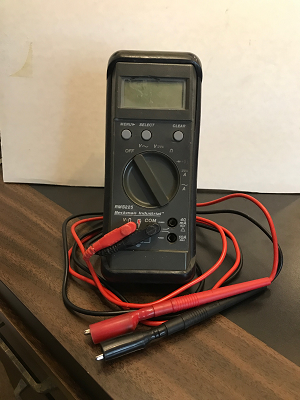
If you are a
home do-it-yourselfer, there are many decent DMMs available at
reasonable prices. These probably won’t survive as much
‘medieval’ handling as the more expensive units. But, if they break,
they’re much cheaper to replace.
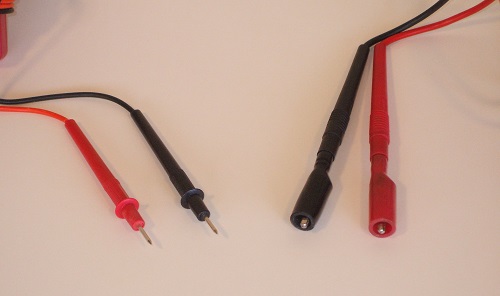
Tech Tip: Consider Upgrading to More Useful Test Leads
The
“stock” test leads included with most standard digital multimeters are
of decent quality, but they are usually just plain test probes.
Depending on how you use your meter and what you need to measure, other
options may make your work quite a bit easier.
For alarm service use, I upgraded the factory test leads that came
with my Beckman Industrial Model RMS225. I bought a set of aftermarket
test leads with various screw-on attachments to make some common tasks
easier. These are very well made, and include several different
specialty tips that come in handy.
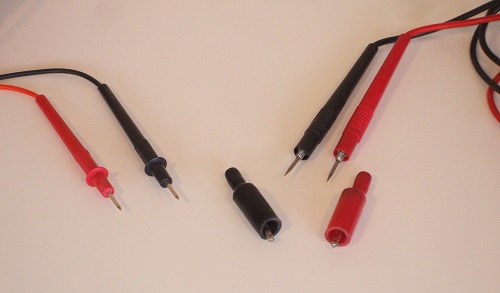
The
most useful of these to me are the alligator clips tips, which allow
you to make quick connections to battery terminals, alarm panel screws,
or bare wires simply by clamping on the alligator clips.
This greatly simplifies the testing of batteries, or the reading of a varying voltage or resistance, without having to manually hold the test probes against the terminals being tested.
When you need regular test probes, just remove the alligator clips. Or, you can screw on a
different accessory attachment. This test lead kit came with adapters
for ring terminals, banana plugs, micro-clips, and of course, alligator
clips.
These clips are especially helpful when troubleshooting intermittent
switches. Just connect the clips to the switch wires, then use the
Max/Min feature to record what happens when you move to the problem
switch to spray chiller or rap on it.
You can learn tips on how
to use a multimeter by reading some of my pages covering specific
troubleshooting problems, as well as any of the many multimeter
tutorials available elsewhere on the web.
See how to use a digital multimeter for testing an alarm system battery.
Related Articles:
Wire Stripper Tools, Cutters, and Crimpers
The All in One Screwdriver and Other Useful Screwdrivers
Using a Tone and Probe Kit for Finding Cut Alarm Wires
Using a Continuity Tester for Alarm Installation and Service
MagLite LED Flashlight and Other Small Flashlights
Electrician Tool Pouch And Other Tool Bags and Buckets
Return to Alarm Installation Tools from Digital Multimeter Page
Return to Home Security Systems Answers from Digital Multimeter Page
Note: Feel free to print any of the articles on this site for personal, non-commercial use. Just look for this button:
If you found this website especially helpful, you might want to consider making a small donation. Since 2011, AzAlarmGuy has been providing free help and advice on home security systems to all of those in need.
Your gift, in any amount, will help me keep this website a free resource for anyone needing help with alarm system issues or questions.
Disclosure
I receive affiliate commissions from some of the companies and products I discuss. These commissions don't change the price that you pay.
Rest assured that this compensation does not influence my recommendations. I only endorse products and services that I truly believe to be an honest value for you, as a visitor to my site.
For more details, see my full disclaimer.





